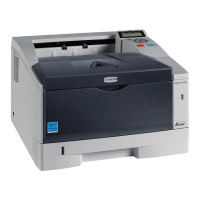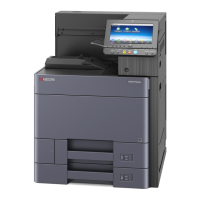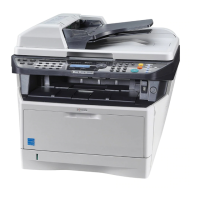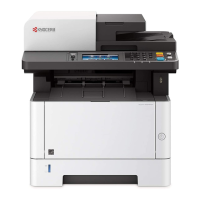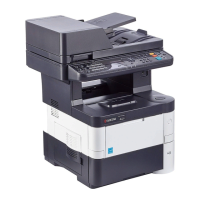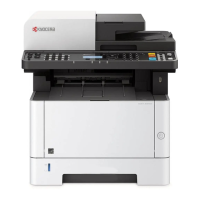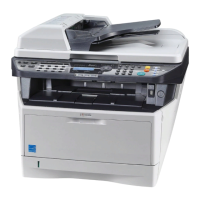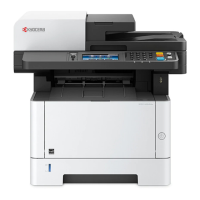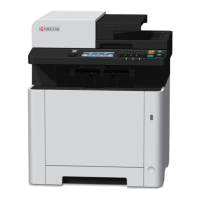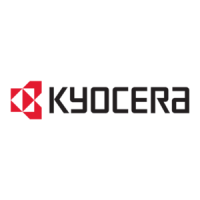
Do you have a question about the Kyocera ECOSYS PA4500 Series and is the answer not in the manual?
| Brand | Kyocera |
|---|---|
| Model | ECOSYS PA4500 Series |
| Category | All in One Printer |
| Language | English |
Details on the Energy Saver function to reduce power consumption and costs.
Explains the EcoPrint function to save toner consumption for non-critical prints.
Methods to protect data on SSD, prevent document loss, and secure access.
How to log in to the machine simply by touching an ID card for user authentication.
Available functions for administrators to enhance machine security settings.
How to prevent unauthorized software execution and maintain system reliability.
How to print documents directly from a USB drive without using a PC.
Accessing the machine remotely for printing, sending, or downloading data.
Provides important safety warnings, symbols, and environmental considerations for machine use.
Outlines essential precautions for handling consumables and operating the machine safely.
Information regarding Class 1 laser product classification and safety in Europe.
Details laser safety standards and compliance for products marketed in the United States.
Emphasizes the power plug as the primary isolation device for electrical safety.
Highlights security risks associated with wireless LAN and how to mitigate them.
Describes potential unauthorized network access and illegal actions.
Explains how to connect the machine to a PC via USB or network, including Wi-Fi and Wi-Fi Direct.
Procedure for turning on the machine's power switch.
Steps for safely turning off the machine's power switch.
Step-by-step guide on how to log in to the machine using user credentials.
Procedure for logging out of the machine to end a user session.
Instructions for setting the machine's local date, time, and time difference from GMT.
Detailed steps for setting up the machine's wired network connection and TCP/IP settings.
Procedures for configuring wireless network settings, including Wi-Fi and Wi-Fi Direct.
Guides on configuring Wi-Fi Direct for connecting computers or handheld devices to the machine.
Lists available software for Windows, including printer drivers and utilities for download.
Step-by-step guide on downloading and installing software from the website onto a Windows PC.
Procedures for removing installed software from your computer.
Instructions for installing printer functionality on a Mac computer via download.
Details various security functions to protect operation and print data, including user login.
Information on configuring settings and managing the machine via Command Center RX.
Steps to access the machine's web interface using its IP address or host name.
Guide on modifying the machine's security settings through the Command Center RX interface.
How to change device information, such as the host name, via Command Center RX.
Configuration steps for sending email notifications upon job completion using SMTP settings.
Procedure for creating a new custom box within the Document Box for data storage.
Steps to print documents that have been previously stored in a custom box.
Instructions on how to load paper into the machine's various paper trays and cassettes.
General guidance on loading paper into the multi-purpose tray and cassettes.
Important precautions for loading paper correctly to prevent jams and ensure print quality.
Detailed steps for loading paper into the machine's paper cassettes.
Specific instructions for loading statement paper into cassettes, noting model variations.
Instructions for loading paper into the machine's multi-purpose tray, including capacity and paper types.
How to set the paper size and media type for cassettes, multi-purpose tray, and feeders.
Overview of the printer driver's settings screen and its various tabs for configuring print jobs.
Instructions for printing documents on standard paper sizes using the printer driver.
How to register and print using paper sizes not included in the machine's default settings.
Using the Universal Print cloud service for printing jobs via the cloud.
How to cancel a print job that has been sent but not yet started printing.
Printing directly from handheld devices using AirPrint and Mopria, without installing drivers.
Connecting and printing directly between devices using Wi-Fi Direct, bypassing access points.
How to save print jobs to the machine's Job Box for later printing or reuse.
Printing documents stored in the Private Print Box, requiring an access code for confidentiality.
Printing documents saved in the Stored Job Box for repeated use, optionally with an access code.
Facilitates additional prints of documents already printed, storing data in the Quick Copy Job Box.
Produces a single proof print and holds remaining copies, allowing printing of remaining copies later.
Retains print jobs with a PIN code for secure output, requiring the PIN for printing.
Saving jobs to Universal Print with PIN codes for enhanced security and cloud-based printing.
Configures settings for the Job Box, including maximum stored jobs and automatic deletion.
Monitors printer status, provides reporting, and displays job progress, paper, and toner status.
Procedures for canceling print jobs that are currently processing or waiting to print.
Explains the four types of document boxes available: Custom Box, Job Box, and USB Drive Box.
Step-by-step instructions for creating a new custom box for storing data for later retrieval.
How to modify the properties and information of an existing custom box.
Procedures for removing a custom box and its contents.
How to save print data from a PC into a custom box for future use.
Steps to print documents that have been stored within a custom box.
Steps to delete specific documents or files stored within a custom box.
Instructions for inserting a USB drive into the machine's USB slot.
Proper procedure for safely removing a USB drive to prevent data damage.
How to check the status of jobs currently being processed or waiting to be printed.
Explains how to view job statuses, including processing, pause, canceling, and waiting states.
How to check the history of completed jobs, including job status icons.
How to check the current levels of toner and paper remaining in the machine.
Configure network settings for wired and wireless connections.
Configure how the machine handles errors, such as duplex paper errors or mismatches.
Configure timer settings such as Auto Panel Reset, Panel Reset Timer, and Sleep Timer.
Configure security functions to protect printer operation and print data.
Protect the machine by blocking interfaces with external devices like USB hosts or optional interfaces.
Specify security levels for network and machine settings, recommending 'High' for normal use.
Configure settings for data stored on the optional SSD and machine's memory, including password and initialization.
Configure Secure Boot to detect firmware tampering during machine startup.
Prevent unauthorized software and tampering, ensuring system reliability.
Configure settings for machine management, including user login and job accounting.
Configure print settings such as paper source, auto cassette change, MP tray priority, and duplex mode.
Configure network settings, including host name, Wi-Fi Direct, and Wi-Fi settings.
Configure Wi-Fi settings, including network selection, connection modes, and security.
Configure TCP/IP settings, including IPv4, DHCP, Auto-IP, IP address, and DNS server settings.
Configure TCP/IP (IPv6) settings, including manual address specification and DHCPv6.
Configure settings for remote operation of the machine, including use restriction.
Configure wireless network settings, including connection status and setup methods.
Configure security levels for network access and customize security functions.
Protect the machine by blocking interfaces with external devices like USB hosts or optional interfaces.
Specify security levels for the machine, recommending 'High' for normal use.
Configure settings for data stored on the optional SSD and machine's memory, including password and initialization.
Prevent unauthorized software and tampering, ensuring system reliability.
Manages user authentication and accounting, covering user login and job accounting procedures.
Activates and configures the user login administration feature for authentication.
Enables the user login administration feature, allowing configuration of authentication settings.
Configures user authentication settings, including account lockout policies to prevent unauthorized access after multiple failed attempts.
Enforces password policies to prohibit weak passwords and enhance security.
Procedure for adding new local users to the machine's user list.
How to manage users printing from PCs by configuring printer driver settings for user login.
Set server types for network authentication, including NTLM, Kerberos, and Ext. server configurations.
Grant local user rights to network users and configure default local user permissions.
Configure authentication types for ID cards, including key login and additional authentication options.
Manages print counts by individual accounts through assigned IDs, enabling tracking of job usage.
Activates job accounting functionality, allowing for the management and tracking of print jobs by account.
Set access permissions for job accounting, choosing between local and network access.
Procedure for adding new individual accounts for local job accounting.
Restricts machine usage by account or limits the number of available sheets for printing.
Configure settings in the printer driver to manage jobs printed from a PC via the network using job accounting.
Procedures for replacing the toner container when it is low or empty.
Instructions for replacing the waste toner box when it becomes full.
General guidelines and checkpoints for solving common machine operation troubles.
Troubleshooting steps for issues like blank sheets, paper jams, and multi-feeds.
Solutions for common printed image issues like light, dark, fuzzy, or skewed printouts.
How to operate the machine remotely via browser or VNC software for troubleshooting and explanation.
Guidance on responding to various machine messages, including administrator rights, access denied, and paper errors.
Troubleshooting steps for incorrect account IDs, job accounting restrictions, and storage errors.
Instructions for clearing paper jams from various locations within the machine.
Detailed procedures for clearing paper jams from various locations within the machine.
Guidelines for selecting suitable paper, covering condition, ingredients, smoothness, weight, and moisture content.
Lists all supported paper sizes for cassettes, multi-purpose tray, and custom sizes.
Details the machine's specifications, including type, printing method, paper weight, type, size, and warm-up time.
Details the machine's printing capabilities, including speed, resolution, operating systems, and emulations.
Explains how to back up machine data using KYOCERA Net Viewer and Command Center RX to prevent data loss.
Lists security functions available at different levels (Level 1, 2, 3) for TLS, IPP, HTTPS, and Enhanced WSD.
Configuration options for IPv4 settings in wired networks, including DNS over TLS.
Configuration options for IPv4 settings in wireless networks, including DNS over TLS.
Configuration options for IPv6 settings in wired networks, including DNS over TLS.
Configuration options for IPv6 settings in wireless networks, including DNS over TLS.
Configure lockout policies for user accounts to prevent unauthorized access after multiple failed attempts.


